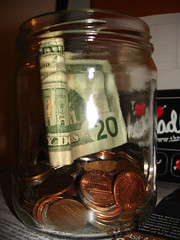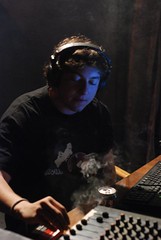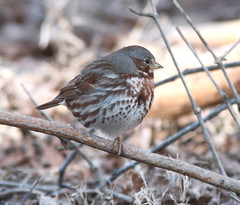 Bum Rush the Charts and the recent internet radio licensing changes point to big things for indie artists.
Bum Rush the Charts and the recent internet radio licensing changes point to big things for indie artists. It’s now the eve of Bum Rush the Charts. An initiative within the podcasting and new media  spaces to send a podsafe artist to the top of the iTunes music charts. The organizers are using the initiative as a proof of concept to tell major media and the major labels that podcasting and new media is a social movement, and one to take seriously. Thanks to the press that BRTC is getting within news organizations such as the BBC, I think there WILL be some sort of statement or at least an acknowledgment of the event.
spaces to send a podsafe artist to the top of the iTunes music charts. The organizers are using the initiative as a proof of concept to tell major media and the major labels that podcasting and new media is a social movement, and one to take seriously. Thanks to the press that BRTC is getting within news organizations such as the BBC, I think there WILL be some sort of statement or at least an acknowledgment of the event.
While I believe that someone at the labels will at least know about the event, I don’t think it sends quite the message that many of the organizers are hoping for.  Traditional media and the music labels are well aware of the power of social media. Places like MySpace and YouTube make headlines almost daily. To think that these organizations are clueless to the power of social networking is probably short sighted. My thought is that the labels and major media outlets will think of this not as a proof of concept, but a flash event. Black Lab tops the charts for a day or so, then their watered-down, manufactured, underpaid artists will be back up top a few days later. To those the organizers are trying to reach, I believe that the statement will not be as strong as we would like it to be.
Traditional media and the music labels are well aware of the power of social media. Places like MySpace and YouTube make headlines almost daily. To think that these organizations are clueless to the power of social networking is probably short sighted. My thought is that the labels and major media outlets will think of this not as a proof of concept, but a flash event. Black Lab tops the charts for a day or so, then their watered-down, manufactured, underpaid artists will be back up top a few days later. To those the organizers are trying to reach, I believe that the statement will not be as strong as we would like it to be.
Black Lab was chosen for this initiative because they were actually dropped by two major labels (Geffen and Sony/Epic). Through each of these, the band had to fight to win back the rights to their OWN music. The labels said that one of their latest albums, “See The Sun” had no more than one decent song. Since the band won the rights to their music back and released it to the world of podcasting, they have found great success with many of the songs on the album. At least half of the songs on the album have reached the top 10 list of podcasting on the Pod Music Countdown over the last year. They have sold countless CDs and song tracks through iTunes relying on the power of new media and podcasting. When it comes to sending a “you lost out” message to the labels that dropped them, Black Lab couldn’t have been a better choice.
Bum Rush the Charts is a great proof of concept. It will be an event we can point to that will open many eyes to new media and podcasting. However, those eyes are not necessarily those of the major labels, but the eyes of other bands, fed up by their money grabbing contracts with the major labels to the power of “going independent.” Black Lab was able to win back the rights to their own music. Others may be able to so as well. It will open the eyes of those current independent artists that are hesitant to make their music available to podcasters. BRTC has the potential to start a brand new wave of artists that are eager to get a piece of the new media bandwagon. Until more artists start to do things on their own and show the world that they are successful in doing so, we won’t see any significant change in the major labels. Hopefully, initiatives like this will help expose how the major labels are robbing artists.
 Let’s do some of the math for a traditional iTunes purchase.
Let’s do some of the math for a traditional iTunes purchase.
On a 99 cent iTunes music purchase of an RIAA artist:
- 19 cents go to Apple
- 75 cents go to the label
- 5 cents go to the artist
On a 99 cent iTunes music purchase from an independent artist:
- 19 cents go to Apple
- 80 cents go to the band
(numbers courtesy of Bum Rush the Charts)
If a RIAA artist was able to sell 100,000 tracks from iTunes, their cut would be a whopping $5000. Meanwhile, the label has made $75,000 off of music they did not write or perform. An independent artist would only need to sell 6,250 tracks to make that same $5000. 100,000 tracks would net an independent artist $80,000! By some estimations, the 5% artists are making through iTunes is very generous compared to revenue brought in from CD sales and radio airplay (saying nothing about all those RIAA settlements).
It’s a sad, sad world when a third party can come in, grab ownership of your own work, and make 15 times as much as you do off your own creation.
New Licensing rates for Internet Radio
A few weeks ago, the Copyright Royalty Board (CRB) revised their fee schedule for internet radio. The retroactive rates (back to 2006) will also rapidly increase for the next 3 years.
$0.0008 in 2006
$0.0011 in 2007
$0.0014 in 2008
$0.0018 in 2009
(numbers courtsey of Save-Internet-Radio.com)
These rates are per performance. A performance equates to one person listening to one song. Multiply these number times 1000 listeners for one song, and they’re paying $1.10 per song in 2007. Multiply that by the number of songs played per day, and you get a total licensing fee of over $150,000. The cost to play the music for some will exceeded the total revenue coming into the station. The rates are so outrageous that many internet radio stations and companies are screaming that it will END internet radio. For a great many of stations, it will… especially those running on a small budget and find themselves bankrupt having to pay retroactive fees there weren’t ready for.
I’m of a slightly different viewpoint on all of this. Yes, I agree that the new licensing structure is absolutely horrible. Over-the-air radio stations do not need to pay per-performance; rather they pay a much more reasonable flat-rate license. There WILL be internet radio stations that will go bankrupt paying retroactive fees, and a significant number of them at that. Those that DO survive will either be owned by media giants such as Clear Channel, or the rare internet radio stations that can limp past the retroactive fees and restructure their programming. INSERT INDEPENDENT ARTISTS.
How to streaming internet radio stations survive in a money grabbing, license fee bogged down world? They play a considerably larger percentage of independent music. License fees for indie and small label artists are cheep or non-existent. They don’t follow the obscene license structure set forth by the CRB and the RIAA. If internet radio is going to survive this onslaught brought on by the CRB, it NEEDS to turn to independent and small label artists. There is virtually no other way around it. Suddenly, independent artists have another segment of the music listening audience that will be able to hear their music while the major labels shoot themselves in the foot.
 Indie music will always be indie music. The percentages of those that do well are slim right now, and despite the resurgence of independent music in the last few years, those numbers will remain fairly small. Even so, there is a growing potential for independent and small label musicians to do well both financially and in social reward. Most importantly though is the opportunity to make a lasting impact on the music industry as a whole. That’s what I’m really excited about!
Indie music will always be indie music. The percentages of those that do well are slim right now, and despite the resurgence of independent music in the last few years, those numbers will remain fairly small. Even so, there is a growing potential for independent and small label musicians to do well both financially and in social reward. Most importantly though is the opportunity to make a lasting impact on the music industry as a whole. That’s what I’m really excited about!















 Digg/mesoed
Digg/mesoed Flickr/kcweather
Flickr/kcweather Myspace/lookingoutthewindow
Myspace/lookingoutthewindow Facebook/Ed Roberts
Facebook/Ed Roberts Linkedin/eroberts
Linkedin/eroberts Twitter/edroberts
Twitter/edroberts YouTube/mesoed
YouTube/mesoed Del.icio.us/mesoed
Del.icio.us/mesoed Technorati/mesoed
Technorati/mesoed Blog/Ed Roberts
Blog/Ed Roberts